Chicagoans rally together for Women’s March
January 25, 2017
Protesters filled downtown Chicago’s Michigan Avenue on Saturday, waving signs and singing chants such as “These are our streets!” and “We don’t want your tiny hands anywhere near our underpants!”
Marchers of all ages, races, sexualities, and genders parade through the city in unity, all bearing the same message: to promote women, in some capacity or another. “I was so excited to go to the protest,” Metea Valley junior Katie Reed said. “Sometimes I feel like I can’t really express my opinion and make a difference where I live yet because I can’t vote, but when I got there, I was overwhelmed with this sense of calmness and this feeling of, ‘Wow, I’m part of a movement that’s making a difference.’ and it felt amazing.”
Millions of women and men from all faiths and walks of life gathered around the globe to support human rights by protesting in the Women’s March on Washington last Saturday. Sister marches were held in Chicago, New Zealand, Berlin, London, Seattle, Boston, New York, and L.A., but the main event took place in Washington D.C.
Organizers intentionally set the march on the day after President Trump’s inauguration to send the incoming administration a message. “I think that it was crucial to have it after he was inaugurated. We need to show Donald Trump that women aren’t going to just be grabbed by the ‘whatever,’” Reed said, referencing a comment made by President Trump in 2005 that sparked mass controversy.
The Chicago Police Department granted the organizers of the Chicago Woman’s March an 80,000 person permit, but were met with approximately 250,000 people, according to volunteer Diane McCarthy. They ended up canceling the official march after the rally, but marchers paraded through the streets anyways. Although there was a surplus of people, there were no arrests made or any issues that had to be dealt with. “There haven’t been any disruptions…this group of people has been a pretty calm and cooperative bunch,” fire marshall Frank Velez said.
Protesters showed up to support the cause in various ways: as marchers, as volunteers, and in solidarity. People who were not able to be there were able to show support in other ways.
Many stores had signs in their windows showing their support for the cause. “We’ve been busy all morning, which is great because I wasn’t able to march with everyone else. At first I was pretty sad, but there have been so many people in and out of here from the protest. It feels like I’m kind of in it anyways,” employee of a nearby store Carla DeWaard, said.
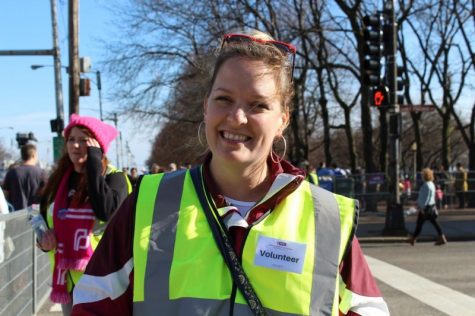
“I’m here to make sure everyone with disabilities who wants to participate is able to. I really support the cause, so I think it’s important to gather everyone who can come to be here.” – Molly Johnson
The volunteers that showed up were from numerous organizations in Chicago – ranging from schools to local clubs to individuals who just wanted to make sure everyone had a good, safe time. One of the volunteers, Molly Johnson, who is deaf and can read lips, spent her time helping those who couldn’t during the protest. “I’m here to make sure everyone with disabilities who wants to participate is able to. I really support the cause, so I think it’s important to gather everyone who can come to be here,” Johnson said.
When the topic of the election came up her expression shifted. “The new incoming administration is scary because of how many changes and reforms they’re going to make of our healthcare system, amongst other things. A lot of people rely on what we have, including me, so I’m also here to fight for that,” she added.
The tone of the march was uplifting and determined in the sense that everyone was there to empower each other and support one another, but there was a melancholy feeling that still lingered in the air. “Initially, I was pretty excited to be here but in all honesty, I’ve been sad all day looking at all the people who are going to potentially lose rights, and the people who feel belittled by this new administration’s narrative.” marcher Kelly Holst said. Many people felt that just marching wasn’t enough. “Don’t just hold signs and sing chants. Do something. Vote in the midterm elections in two years,” marcher Lindsey Holst said.
While the march represented very important and sometimes polarizing issues to women, it didn’t mean that it wasn’t still a great experience for goers.“My experience was fantastic! Everyone there was so kind and sweet. I got to hug, cry, and sing with complete strangers and it was amazing,” Reed said. “I think that this will impact Trump supporters and show them that we aren’t passive, and we will fight to be seen as equals,” she added.
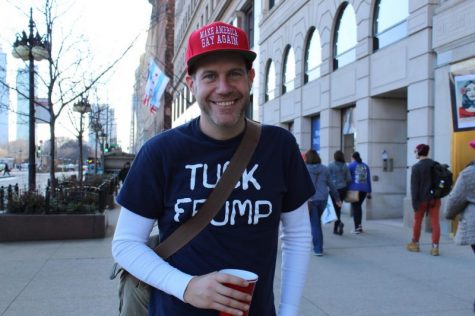
“I think what I love about this is that it’s global. The future is female. Women are the creators of this world, and through them we are going to find our collective humanity, so I’m here in solidarity.” — Andrew Duckett
Many people felt empowered by this large wave of unity and belief in the same cause. “I think what I love about this is that it’s global. The future is female. Women are the creators of this world, and through them we are going to find our collective humanity, so I’m here in solidarity,” marcher Andrew Duckett said.
While the majority of the people present supported the cause, there were also people there who disagreed with the ideology of the event. “I think the whole thing is stupid,” Mark Owen from Schaumburg said. “First of all, women already have equal rights. Second of all, people here don’t even know what they’re marching for. You look around and see Black Lives Matter posters, and then you look the other way and hear people chanting for free healthcare. This isn’t a women’s march, it’s just another anti-Trump protest,” Owen said.
In the end, supporters were convicted in what they were marching for.
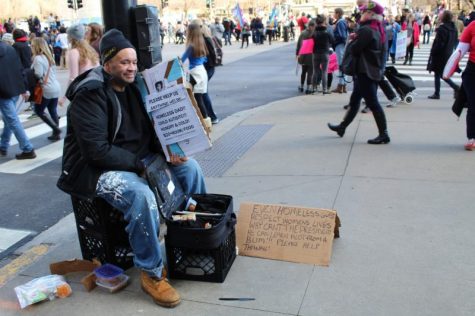
“I’m here because I have to be here. The causes that you see these people supporting are causes that need our attention.” — Bala Oweez
“I’m here because I have to be here. The causes that you see these people supporting are causes that need our attention. You see black women fighting for Black Lives Matter. You see these old women fighting for healthcare rights. You see people fighting for trans people. These are all things that affect America’s women, and it’s completely outrageous to think that the guy who just got elected can’t even respect America’s women,” protester Bala Oweez said.
A homeless man, Oweez held a sign saying “Even homeless guys can respect women’s lives. Why can’t the president? He can learn a lot from a bum. Please help. Thanks.”
Others felt the same way. “Intersectional feminism is very important to me. All of the issues brought up at the March impact women, such as racism, xenophobia, and homophobia. They all needed to be represented at this march. I’m so glad that I was able to go,” Reed said.
Marchers were there for a multitude of reasons. They were there for their daughters, for their mothers, and for their sisters; they were there to promote healthcare policies, to promote basic human rights, and to promote the message of respect for all. Regardless of why they marched, the protestors started off President Trump’s presidency with a loud message and a new chapter in the history of women’s rights.
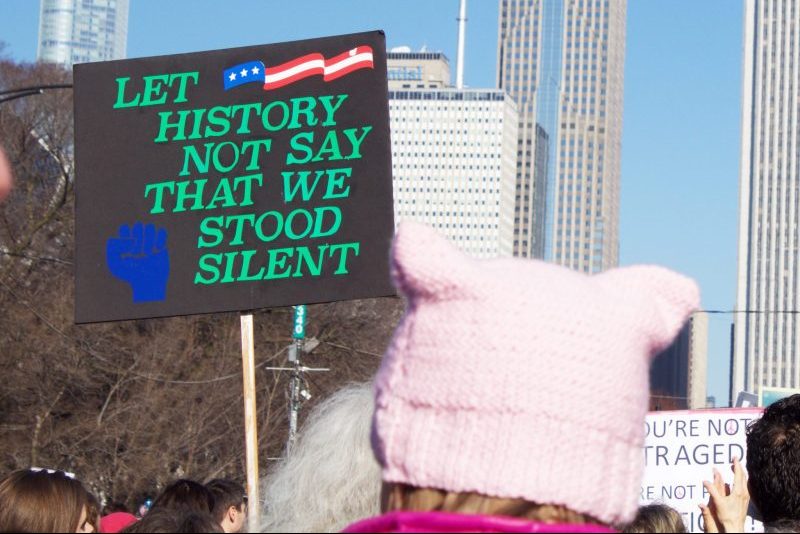
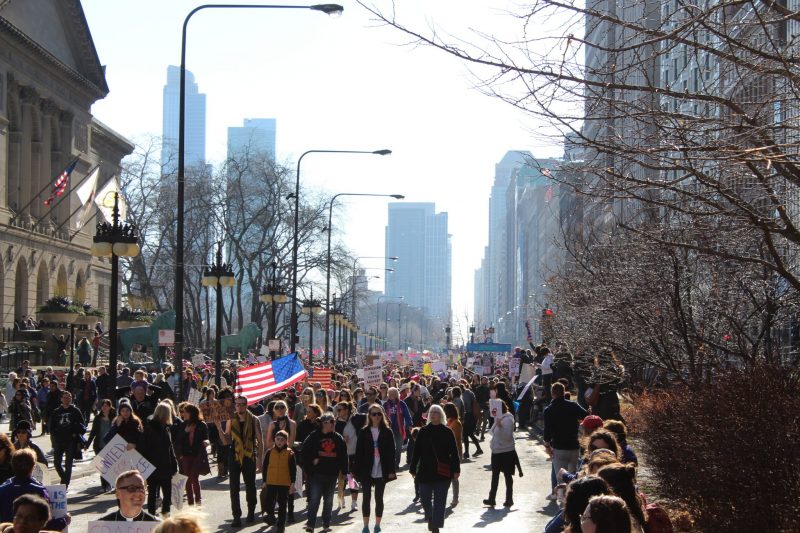
C28 • Sep 22, 2017 at 8:11 am
“Marchers were there for a multitude of reasons. They were there for their daughters, for their mothers, and for their sisters; they were there to promote healthcare policies, to promote basic human rights, and to promote the message of respect for all. Regardless of why they marched, the protestors started off President Trump’s presidency with a loud message and a new chapter in the history of women’s rights.”
What Rights are they trying to get? Superiority? Unless it’s the 1900’s, We’re good on equality. Sad
Will • Jan 26, 2017 at 9:40 am
Bro what is this
???
Will • Jan 26, 2017 at 9:38 am
that march was dumb
Me • Jan 25, 2017 at 4:33 pm
I hope that the people who marched don’t think that marching is ALL they need to do to affect change. If all we do as citizens is protest, it becomes ineffective quickly. We need to do things like write to our representatives, volunteer for organizations that really help people, and sign petitions. There’s definitely a time and a place for protests, but they’re useless if that’s the only thing we do if we think something is unjust.
qawsedr • Jan 25, 2017 at 12:41 pm
i agree with mark owen
Ryan • Jan 25, 2017 at 12:38 pm
Maybe i am missing something obvious, but just exactly what rights are women going to loose? The only “right” that women may loose is the “right” to kill unborn babies, which in itself isn’t even a definitive right. I support Trump, but if anyone can point out a basic human right that he is going to take away from women i will gladly go protest and voice my disapproval along with these marchers.
... • Jan 26, 2017 at 7:29 am
He’s not going to strip women of their rights!
DarthVader • Jan 25, 2017 at 9:13 am
The ralley was pointless
What the Heck!? • Jan 25, 2017 at 8:27 am
Real quick i’m sorry if i OFFENDED anybody just voicing my opinions.
Chroma • Jan 25, 2017 at 8:23 am
This was a really neat article :^)
I didn’t realize a march was happening so nearby, although I knew of them happening.
Just don’t forget the oxford comma (paragraph 2).
What the heck!? • Jan 25, 2017 at 7:53 am
Why just why, Trump is NOT going to strip women of their rights even if he wanted to for some reason he can’t the constitution protects the rights of U.S. citizens so he can’t do any right striping! He can’t grab anyone by anything now that he’s president Trump may not be the brightest bulb out their but i’m certain if the president grabs someone by something he would be IMPEACHED for doing that. Also while i’m here id like to talk about some of these anti trump protests they are unnecessary protesting against him is not going to get him kicked out of office or do anything it’s just bunch of BUTTHURT people (some of them being people who didn’t vote) blocking traffic and whining over the candidate they wanted to win not wining. They are also mad that now they wont get into school for free or get everything for free well guess what free schools mean higher taxes. People just think the world should be handed to them but it’s not true life is more satisfying when you earned success or a happy life rather than it jut being given to you. Now granted there are some valid reasons for hating trump he is kinda racist and mocks the disabled but that doesn’t mean someone like Hillary would have ben better she wanted to ban stuff like rights to Cary guns she wanted to basically abolish one of our constitutional rights and people are SAD over this! Lastly people are saying the electoral collage is stupid and POPULAR VOTE should decide the winner well i have two things to say to that 1. Our founding fathers came up with the electoral collage so by calling it stupid you are essentially saying the people who founded this country and fought for our independence are dumb and that is just wrong and 2. If you want a certain candidate to win vote for an electoral collage member who would vote in favor of your candidate! We all need to move on the election is over and so is 2016 (Gosh that year was a nightmare) so lets move on and make 2017 great again because the year hasn’t started on a high note we all need to grow a spine and deal with it because if we whine over everything not going our way this country’s future will be made of picky spoiled whiny adults acting like spoiled children.
What the heck!? • Jan 25, 2017 at 8:07 am
OK i wanted to correct one thing i said in my 1st comment i can see why people would want guns to be banned because they don’t want to get shot while taking a walk or riding a bike or whatever but criminals wont give up their guns just because their illegal banning guns would mean people can’t defend themselves. Outlawing guns means only criminals will have them and that would just cause chaos. Just wanted to address why i’m saying people shouldn’t be sad over guns being banned’